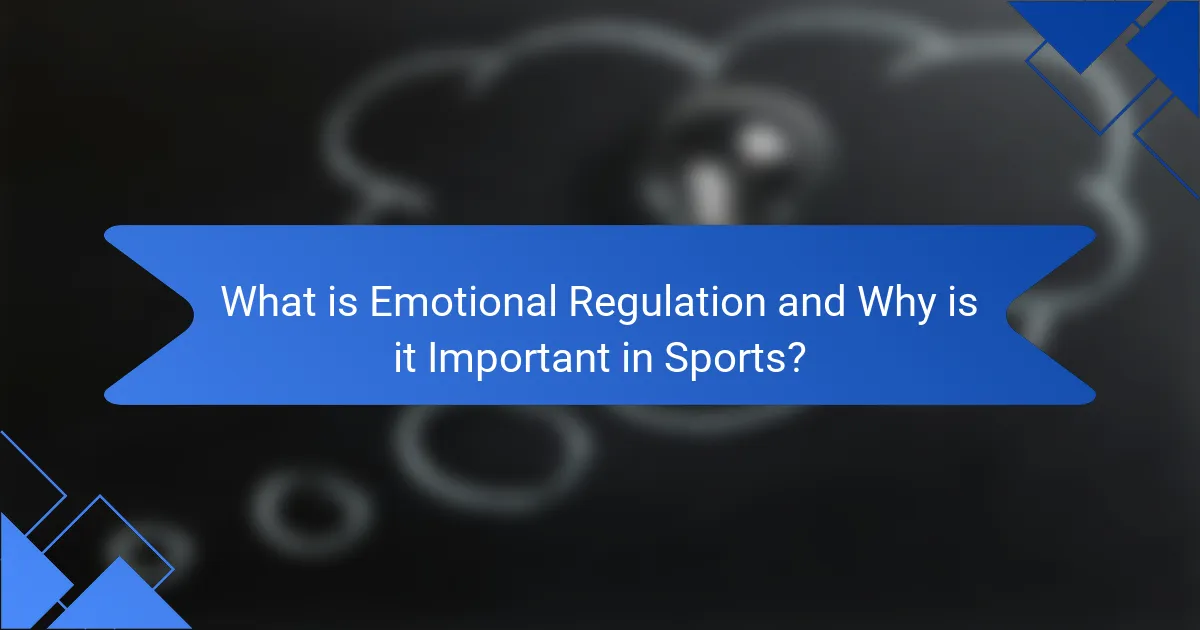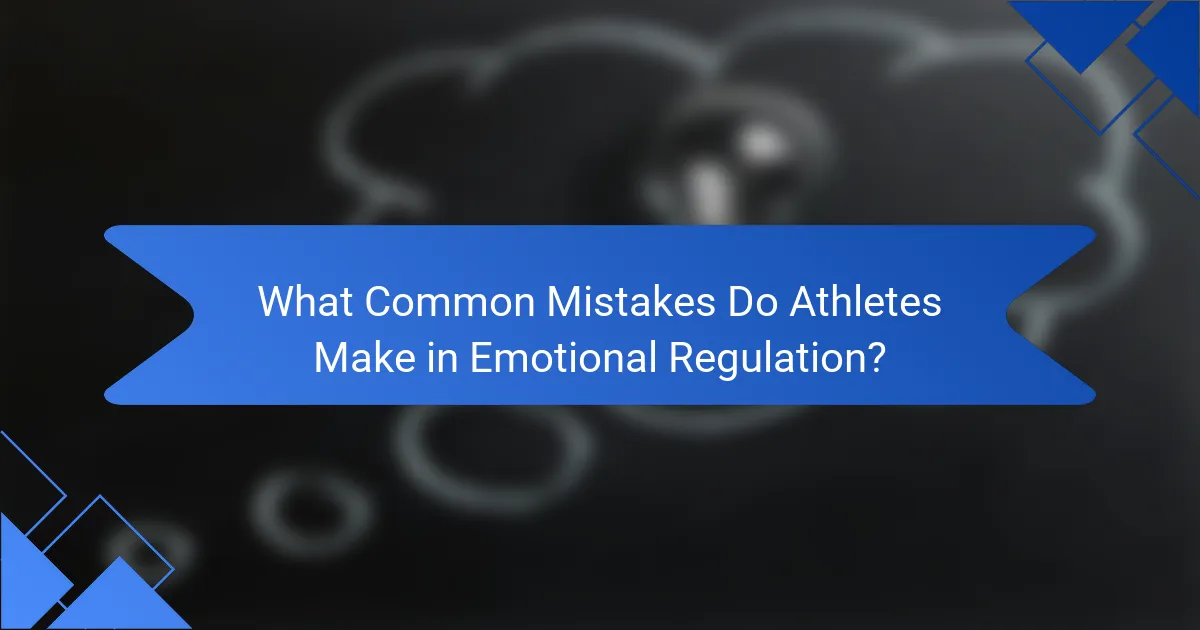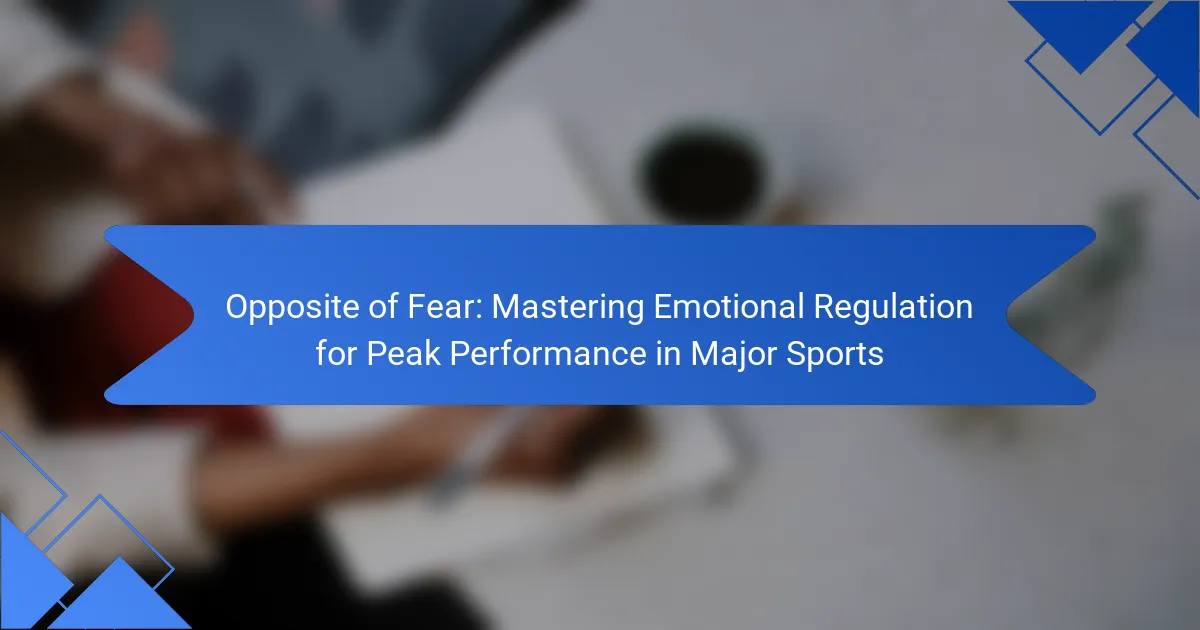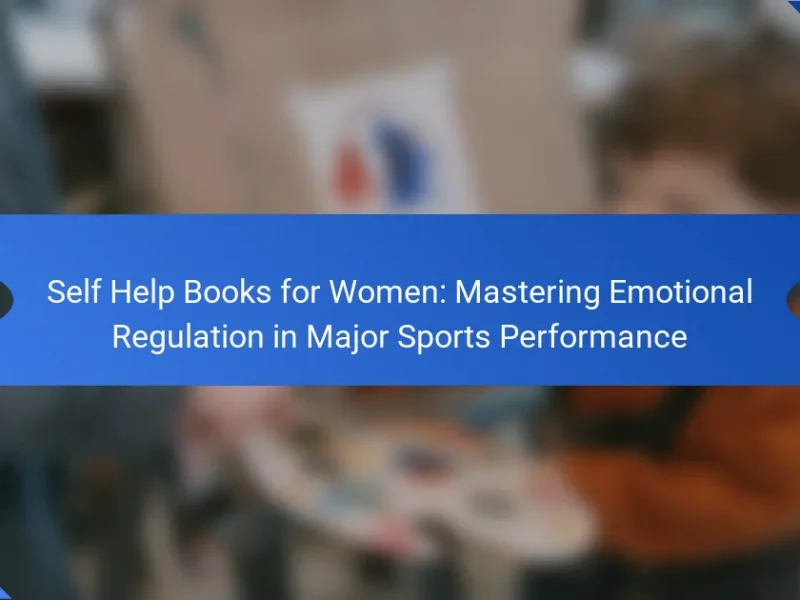Mastering emotional regulation is essential for athletes seeking peak performance in major sports. This skill helps maintain focus, reduce anxiety, and enhance resilience. Key strategies include mindfulness, cognitive restructuring, and breathing techniques. Understanding common mistakes in emotional regulation can further empower athletes to optimise their performance under pressure.

What is Emotional Regulation and Why is it Important in Sports?
Emotional regulation is the ability to manage and respond to emotional experiences effectively, crucial for peak performance in sports. Mastering this skill helps athletes maintain focus, reduce anxiety, and enhance resilience during competition. Effective emotional regulation leads to improved decision-making and performance consistency. Research indicates that athletes who practice emotional regulation techniques, such as mindfulness and cognitive restructuring, experience lower stress levels and higher overall satisfaction in their sport. This mastery allows athletes to transform fear into motivation, ultimately elevating their performance on the field.
How Does Emotional Regulation Impact Athletic Performance?
Emotional regulation significantly enhances athletic performance by reducing anxiety and improving focus. Athletes who master their emotions can maintain composure under pressure, leading to better decision-making and execution during competitions. Research indicates that emotional regulation techniques, such as mindfulness and cognitive restructuring, can lower stress levels and enhance overall mental resilience. This mastery of emotions not only boosts performance metrics but also fosters a positive competitive mindset, essential for success in major sports.
What Are the Key Components of Emotional Regulation Systems?
Emotional regulation systems are essential for athletes to manage fear and enhance performance. Key components include awareness of emotions, cognitive appraisal, coping strategies, and physiological regulation. These elements work together to help athletes maintain focus and composure under pressure, ultimately leading to peak performance.
What Techniques Support Emotional Awareness?
Mastering emotional regulation techniques enhances emotional awareness and improves performance in sports. Techniques include mindfulness practices, cognitive restructuring, and emotional journaling. Mindfulness helps athletes stay present, reducing anxiety. Cognitive restructuring allows for reframing negative thoughts. Emotional journaling fosters self-reflection, identifying emotional triggers and patterns. These methods collectively support emotional intelligence, crucial for peak performance.
How Do Cognitive Reappraisal Strategies Work?
Cognitive reappraisal strategies work by altering the interpretation of emotional stimuli to manage fear and enhance performance. These techniques help athletes reframe anxiety as excitement, thus promoting a positive mindset. For instance, instead of viewing pressure as a threat, athletes can perceive it as a challenge, leading to improved focus and resilience. Research indicates that effective emotional regulation through cognitive reappraisal can significantly enhance athletic performance, contributing to peak outcomes in high-stakes environments.

What Are the Universal Attributes of Emotional Regulation in Sports?
Emotional regulation in sports encompasses skills that enhance performance by managing feelings effectively. Key attributes include self-awareness, emotional control, resilience, and focus. Self-awareness allows athletes to recognise their emotional states. Emotional control helps in maintaining composure under pressure. Resilience enables recovery from setbacks, while focus sharpens concentration on tasks. Mastering these attributes can lead to peak performance in major sports.
How Do Athletes Develop Emotional Resilience?
Athletes develop emotional resilience by mastering emotional regulation techniques. These techniques include mindfulness, cognitive reframing, and stress management strategies. Mindfulness helps athletes stay present, reducing anxiety during competitions. Cognitive reframing allows them to view challenges as opportunities, enhancing motivation. Stress management techniques, such as deep breathing and visualisation, improve focus and performance under pressure. By integrating these practices, athletes can maintain composure, boosting their overall performance in major sports.
What Role Does Self-Awareness Play in Performance?
Self-awareness is crucial for enhancing performance in major sports. It allows athletes to recognise their emotional states and regulate them effectively. By mastering emotional regulation, athletes can mitigate fear and anxiety, leading to improved focus and decision-making. This self-awareness fosters resilience, enabling athletes to adapt to high-pressure situations and maintain peak performance. Studies indicate that self-aware athletes show greater consistency in their performance metrics, highlighting its role as a unique attribute in sports psychology.

What Unique Attributes Distinguish Effective Emotional Regulation Strategies?
Effective emotional regulation strategies are distinguished by their adaptability, mindfulness, and focus on positive outcomes. Unique attributes include personalised techniques, real-time application, and resilience-building exercises. These strategies, such as cognitive reframing and breathing techniques, enhance athletes’ performance by reducing anxiety and fostering confidence. As a result, athletes can maintain composure under pressure, leading to improved decision-making and execution during competitions.
How Do Different Sports Require Tailored Emotional Approaches?
Different sports demand unique emotional approaches to optimise performance. Athletes must master emotional regulation to counteract fear and anxiety, enhancing focus and resilience.
Team sports often require collective emotional management, fostering camaraderie and shared motivation. In contrast, individual sports emphasise personal emotional strategies, as athletes confront internal pressures alone.
For example, a basketball player may rely on team dynamics to boost confidence, while a tennis player must self-regulate during intense matches. Adaptation to these emotional demands is crucial for peak performance.
Understanding these tailored approaches allows athletes to develop effective coping mechanisms, ultimately leading to improved outcomes in their respective sports.
What Are the Psychological Techniques Used by Elite Athletes?
Elite athletes use various psychological techniques to master emotional regulation, counteracting fear to enhance performance. Techniques include visualisation, mindfulness, and cognitive restructuring.
Visualisation involves mentally rehearsing successful performance scenarios, which builds confidence and reduces anxiety. Mindfulness practices help athletes stay present, minimising fear of failure. Cognitive restructuring allows athletes to reframe negative thoughts, transforming fear into motivation.
These techniques are crucial for achieving peak performance in high-pressure situations, enabling athletes to maintain focus and composure. By mastering emotional regulation, elite athletes can consistently perform at their best despite challenges.

What Rare Attributes Contribute to Mastering Emotional Regulation?
Mastering emotional regulation involves rare attributes like resilience, adaptability, and mindfulness. These traits enable athletes to maintain composure under pressure, enhancing performance. Resilience allows for quick recovery from setbacks, while adaptability helps in adjusting strategies during competition. Mindfulness fosters present-moment awareness, reducing anxiety and improving focus. Together, these attributes create a robust foundation for emotional mastery in sports.
How Do Cultural Factors Influence Emotional Regulation in Sports?
Cultural factors significantly shape emotional regulation in sports, impacting athletes’ performance. Different cultures emphasise various emotional expressions, influencing how athletes manage stress, anxiety, and fear. For instance, collectivist societies may encourage emotional restraint, promoting team cohesion, while individualistic cultures may foster self-assertion, enhancing personal performance.
Cultural norms dictate acceptable emotional responses during competition. Athletes from cultures that value resilience may exhibit stronger emotional control, leading to peak performance. Moreover, cultural rituals and practices can enhance emotional regulation, preparing athletes mentally for high-stakes situations.
Additionally, training environments shaped by cultural factors can affect emotional resilience. Coaches who understand cultural backgrounds can tailor emotional regulation strategies, optimising athletes’ mental preparedness. This cultural sensitivity fosters a supportive atmosphere, enhancing overall performance.
In conclusion, cultural factors play a crucial role in emotional regulation, directly influencing athletes’ ability to perform under pressure. Understanding these dynamics can lead to more effective training and better outcomes in major sports.
What Are the Emerging Trends in Emotional Regulation Techniques?
Emerging trends in emotional regulation techniques focus on mindfulness, cognitive restructuring, and biofeedback. These methods enhance athletes’ ability to manage fear and anxiety, leading to improved performance. Mindfulness practices improve present-moment awareness, helping athletes stay focused. Cognitive restructuring aids in reframing negative thoughts, fostering resilience. Biofeedback utilises technology to provide real-time physiological data, enabling athletes to regulate their emotional states effectively. These techniques collectively support peak performance in major sports.

What Common Mistakes Do Athletes Make in Emotional Regulation?
Athletes often make mistakes in emotional regulation that hinder their performance. Common errors include ignoring emotions, overreacting to stress, and failing to implement coping strategies. These missteps can lead to decreased focus and increased anxiety during competition. Recognising and addressing these mistakes is crucial for mastering emotional regulation and achieving peak performance.
How Can Athletes Avoid Overthinking Under Pressure?
Athletes can avoid overthinking under pressure by mastering emotional regulation techniques. These techniques include mindfulness, visualisation, and controlled breathing. Mindfulness helps athletes stay present, reducing anxiety about outcomes. Visualisation prepares the mind for success, enhancing confidence. Controlled breathing lowers stress levels, promoting focus. Together, these strategies facilitate peak performance.
What Are the Best Practices for Implementing Emotional Regulation?
To implement emotional regulation effectively, athletes should practice self-awareness, utilise coping strategies, and engage in mindfulness techniques. These practices help manage emotions and enhance performance.
Self-awareness involves recognising emotional triggers and understanding their impact on performance. Coping strategies, such as deep breathing or visualisation, can mitigate negative emotions. Mindfulness techniques, like meditation, promote emotional balance and focus.
Regularly incorporating these practices into training routines can lead to improved emotional control and peak performance in major sports.
How Can Coaches Support Emotional Regulation in Their Teams?
Coaches can support emotional regulation by fostering a safe environment, teaching coping strategies, and encouraging open communication. Creating trust within the team allows athletes to express emotions without fear of judgment. Implementing mindfulness practices helps athletes manage stress and anxiety, enhancing focus during competitions. Regular feedback and emotional check-ins can also promote awareness and self-regulation, leading to improved performance.
What Role Does Team Dynamics Play in Emotional Management?
Team dynamics significantly enhance emotional management by fostering trust and communication. When athletes collaborate effectively, they experience reduced anxiety and increased resilience. This supportive environment allows individuals to regulate emotions, leading to peak performance. Strong team cohesion can serve as a unique attribute that amplifies emotional stability, essential for high-pressure situations in major sports. As a result, athletes can focus on their performance rather than being hindered by fear or stress.

What Expert Insights Can Enhance Emotional Regulation for Peak Performance?
Mastering emotional regulation enhances peak performance by fostering resilience and focus. Techniques like mindfulness, cognitive restructuring, and breathing exercises empower athletes to manage stress and anxiety effectively. Research shows athletes who practice these methods report improved concentration and reduced performance anxiety. Regular training in emotional regulation can lead to a unique competitive advantage, allowing athletes to perform optimally under pressure.
What Strategies Can Athletes Use to Maintain Emotional Balance?
Athletes can maintain emotional balance by employing strategies such as mindfulness, cognitive reframing, and controlled breathing. Mindfulness enhances self-awareness, helping athletes recognise and manage their emotions. Cognitive reframing allows athletes to shift their perspective on challenges, reducing anxiety and enhancing focus. Controlled breathing techniques promote relaxation, aiding in emotional regulation during high-pressure situations. These strategies collectively support peak performance by fostering a calm and focused mindset.
How Can Visualization Techniques Aid in Emotional Regulation?
Visualization techniques significantly enhance emotional regulation by allowing athletes to mentally rehearse performance scenarios. This practice reduces anxiety and builds confidence, essential for peak performance in major sports. Techniques like imagery and mental simulation create positive emotional states, counteracting fear and stress. As a result, athletes can maintain focus and composure during high-pressure situations, leading to improved outcomes.
What Are the Long-Term Benefits of Mastering Emotional Regulation?
Mastering emotional regulation leads to enhanced focus, resilience, and decision-making in sports. These long-term benefits empower athletes to maintain peak performance under pressure. Improved emotional control reduces anxiety, fostering a positive mindset that enhances overall athletic performance. As a result, athletes experience sustained motivation and greater satisfaction in their sport.


